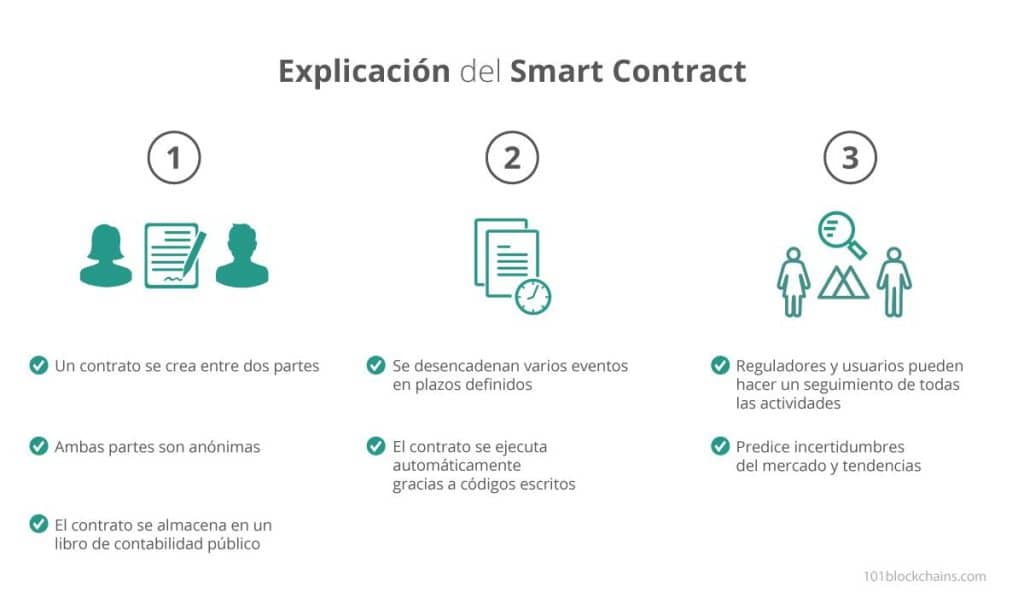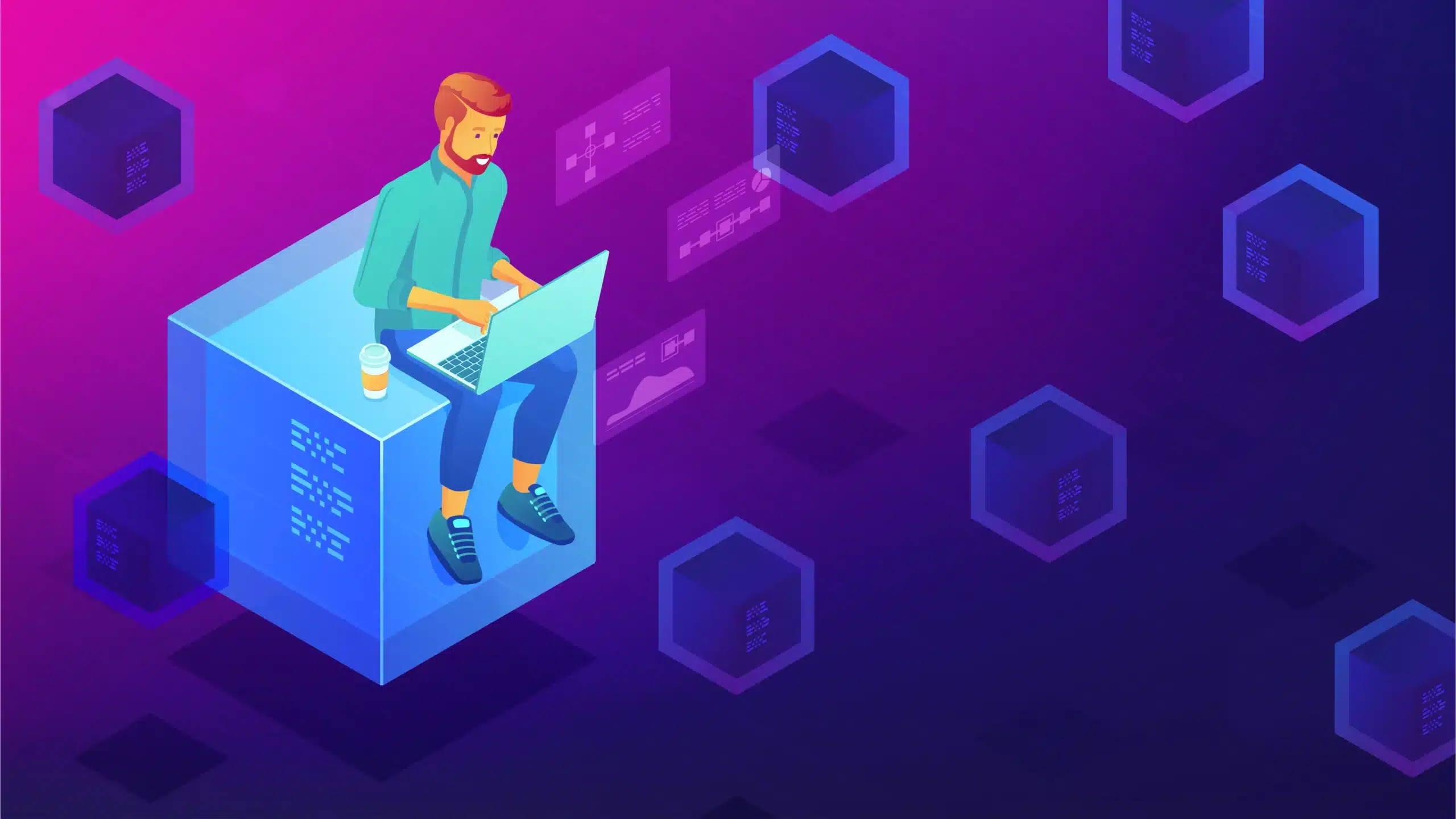What does a Blockchain developer do exactly? Beyond lines of code, their work encompasses the creation of secure, transparent, and seamless systems. A blockchain developer is the expert responsible for building the architecture of a Web3 platform, connecting different components, and implementing Smart Contracts.
What is Blockchain technology?
Before explaining the role of a blockchain developer, we must delve into this technology: blockchain is a decentralized system of digital record-keeping that securely and transparently stores information. It is based on a structure of interconnected blocks. Each block, composed of data and a unique code, establishes its connection to the preceding block through a cryptographic mechanism.
In more technical terms, each block stores information and a hash, which is essentially a code generated from the data contained in the block. This hash acts as a unique “digital fingerprint” for that block and is used to establish a connection with the previous block in the chain. The result is an immutable and secure sequence of blocks that safeguard the integrity of the information.
Instead of relying on a central entity, the blockchain is distributed among multiple nodes in a network. Each transaction is consensually verified by these nodes, ensuring the integrity and security of the information. Decentralization eliminates the need to trust a single authority and provides a solid foundation for transparency and reliability.

What does a blockchain developer do?
Within the Web3 ecosystem, a blockchain developer plays a vital role as the architect behind decentralized applications (dApps) or networks based on this innovative technology. However, this overview barely scratches the surface of the various technical specializations these professionals can address in their daily work. We primarily distinguish three types of blockchain programmers:
Blockchain Network Architects:
A blockchain architect is the mastermind behind the creation of decentralized networks, selecting and programming under languages and protocols that will bring the infrastructure to life. A paradigmatic example of this work is the creation of Ethereum, initiated in December 2013 by Vitalik Buterin. The development of Ethereum involves not only the conception of smart contracts and dApps but also the construction of the network itself.
In its early stages, Ethereum was conceived with a proof of concept (PoC) in Go and C++, laying the groundwork for a pioneering blockchain. Over time, various PoCs evolved and brought the implementation of Smart Contracts to high-level languages like Serpent, Mutan, and LLL. Ethereum’s architecture, written in C++ and Go, marked a milestone in interoperability by allowing two clients to operate jointly on the same blockchain. This technical achievement facilitated the inclusion of clients in other languages, thus expanding the diversity and accessibility of the Ethereum ecosystem. Their main functions are as follows:
Design of Network Architecture:
Define the technical structure of the blockchain network, selecting the necessary protocols, programming languages, and technologies for its implementation.
Development and Maintenance of Nodes:
Implement and maintain blockchain nodes using specific software implementations like Geth, Nethermind, or those adapted to the needs of the network in question.
Interoperability Optimization:
Focus on interoperability between different blockchains, facilitating smooth and secure communication between them to build a more collaborative blockchain ecosystem.
Consensus Selection and Scalability Mechanisms:
Choose and configure consensus protocols (Proof of Work, Proof of Stake, etc.) and scalability mechanisms to improve the performance and efficiency of the blockchain network.
Development of Tools and Frameworks:
Create and maintain tools and frameworks that facilitate the development of decentralized applications and smart contracts on the network.
Smart Contract Developers:
Smart contract developers play a crucial role in the adoption and expansion of the blockchain ecosystem. Their work focuses on creating smart contracts, which are autonomous computer programs designed to automatically execute agreements and transactions when predefined conditions are met. Although initially associated mainly with networks based on the Ethereum Virtual Machine (EVM), based on Solidity, such as Ethereum, Binance Smart Chain, Polygon, and Arbitrum.
Smart contract developers are not limited to writing code; they must also understand the business logic behind the contracts they are automating. This involves close collaboration with stakeholders to ensure that predefined conditions accurately reflect the desired agreements and transactions. Additionally, they must consider security and resistance against possible attacks, as smart contracts operate in a decentralized and public environment.
Creation of Autonomous Programs: Develop codes that constitute smart contracts, autonomous programs designed to automatically execute agreements and transactions.
Selection of Programming Languages: Use languages like Solidity for EVM-based networks and Rust or others depending on the platform, adapting to the diversity of the blockchain ecosystem.
Collaboration with Stakeholders: Work closely with stakeholders to understand and translate business logic into predefined conditions that accurately reflect desired agreements.
Security and Resistance: Consider security aspects, implementing measures to resist possible attacks, given the decentralized and public nature of the blockchain.

DApp Developers (Decentralized Applications):
DApp developers, or decentralized application developers, play an integral role in the blockchain ecosystem, equivalent to full-stack developers in conventional programming. Their work covers the entire spectrum of development, from connecting with Web3 and wallets to creating the front-end through UX/UI interfaces, as well as implementing the back-end.
In terms of connecting with Web3, DApp developers dive into integrating their applications with the Web3 infrastructure, enabling smooth communication with the blockchain and digital wallets. This connection is essential to ensure the interoperability and interactivity of decentralized applications in the blockchain environment.
In the front-end realm, they use advanced technologies like JavaScript, along with popular frameworks such as React JS and Next, to design attractive and functional user interfaces. User experience (UX) and user interface (UI) are critical elements for the success of DApps, and developers strive to create intuitive experiences that facilitate mass adoption.
Regarding the back-end, they collaborate with smart contract developers, using blockchain-compatible languages like Node JS and others. This integration ensures consistency and efficiency in executing business logics and smart contracts on the blockchain.
The versatility of DApp developers is reflected in their ability to address all aspects of development, from technical architecture to the user interface, ensuring a complete and robust experience for end-users. Their multifaceted work contributes to the growth and widespread adoption of decentralized applications across various industries and use cases.
What is the salary of a Blockchain developer?
The salary of a blockchain developer can vary significantly based on various factors, including geographic location, level of experience, market demand, and the specific skills of the developer. Below, I provide a general estimate based on average data up to my last update in January 2022:
- Junior or Entry-Level Blockchain Developer:
- Annual salary: Between $50,000 and $80,000.
- Mid-Level Blockchain Developer:
- Annual salary: Between $80,000 and $120,000.
- Senior or Advanced Blockchain Developer:
- Annual salary: Starting from $120,000 and above, potentially reaching substantially higher figures depending on experience and specialization.
Hiring Blockchain Programmers
At Metlabs, we offer a comprehensive approach to blockchain project development, providing complete solutions ranging from UI/UX design to smart contract and DApp implementation. Our team of blockchain experts is highly qualified and committed to delivering cutting-edge services that drive innovation and efficiency in the blockchain space.
Featured Services:
- UI/UX Interface Design: We have specialists in user interface (UI) and user experience (UX) design working to create attractive and functional interfaces. Our detailed attention to usability and aesthetics ensures that developed DApps offer intuitive and engaging user experiences.
- DApp Development: Our team of blockchain developers is trained in advanced technologies, such as JavaScript and popular frameworks like React JS and Next. From connecting with Web3 to front-end implementation, we commit to developing DApps that excel in terms of performance, security, and usability.
- Smart Contract Implementation: Our team is proficient in various programming languages, including Solidity for EVM-based networks and others like Rust. We ensure the creation of secure and efficient smart contracts that align perfectly with the specific business logics of each project.




